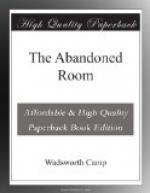Maria’s spirits rose then. He was persuaded to accompany her and Paredes to the music hall. In her dressing-room, while she was on the stage, he played with the boxes of make-up, splashing the mirror with various colours while Paredes sat silently watching.
The alteration, he was sure, came a little later in the cafe at a table close to the dancing floor. Maria had insisted that Paredes and he should wait there while she changed.
“But,” he had protested, “I have missed too many trains.”
She had demanded his time-table, scanning the columns of close figures.
“There is one,” she had said, “at twelve-fifteen—time for a little something in the cafe, and who knows? If you are agreeable I might forgive everything and dance with you once, Bobby, on the public floor.”
So he sat for some time, expectant, with Paredes, watching the boisterous dancers, listening to the violent music, sipping absent-mindedly at his glass. He wondered why Paredes had grown so quiet.
“I mustn’t miss that twelve-fifteen,” he said, “You know, Carlos, you weren’t quite fair to Hartley. He’s a splendid fellow. Roomed with me at college, played on same team, and all that. Only wanted me to do the right thing. Must say it was the right thing. I won’t miss that twelve-fifteen.”
“Graham,” Paredes sneered, “is a wonderful type—Apollo in the flesh and Billy Sunday in the conscience.”
Then, as Bobby started to protest, Maria entered, more dazzling than at dinner; and the dancers swayed less boisterously, the chatter at the tables subsided, the orchestra seemed to hesitate as a sort of obeisance.
A man Bobby had never seen before followed her to the table. His middle-aged figure was loudly clothed. His face was coarse and clean shaven. He acknowledged the introductions sullenly.
“I’ve only a minute,” Bobby said to Maria.
He continued, however, to raise his glass indifferently to his lips. All at once his glass shook. Maria’s dark and sparkling face became blurred. He could no longer define the features of the stranger. He had never before experienced anything of the kind. He tried to account for it, but his mind became confused.
“Maria!” he burst out. “Why are you looking at me like that?”
Her contralto laugh rippled.
“Bobby looks so funny! Carlos! Leetle Bobby looks so queer! What is the matter with him?”
Bobby’s anger was lost in the increased confusion of his senses, but through that mental turmoil tore the thought of Graham and his intention of going to the Cedars. With shaking fingers he dragged out his watch. He couldn’t read the dial. He braced his hands against the table, thrust back his chair, and arose. The room tumbled about him. Before his eyes the dancers made long nebulous bands of colour in which nothing had form or coherence. Instinctively he felt he hadn’t dined recklessly enough to account for these amazing symptoms. He was suddenly afraid.




